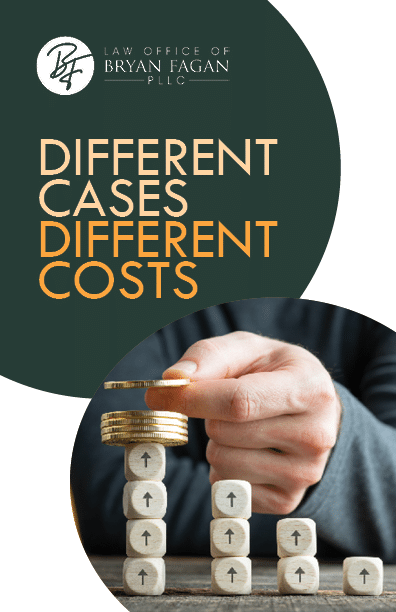
Divorce is a complex process that brings both emotional and financial challenges. Understanding what is included in the average cost for divorce in Texas is essential to prepare for the journey ahead. Divorce costs vary based on the case’s complexity, the services required, and whether the parties can resolve issues amicably. By examining these factors, you can better understand what to expect and how to manage expenses.
Filing Fees: The Initial Expense
Every divorce begins with filing a petition with the court. This step requires a filing fee, which ranges from $250 to $400 depending on the county. Filing fees are unavoidable and cover the court’s administrative costs.
Additional motions, such as those requesting temporary orders, can increase these fees. Serving divorce papers to your spouse also adds to the cost. Hiring a process server or sheriff typically costs $50 to $100. Together, these charges form the foundation of your divorce expenses.

Attorney Fees: The Largest Cost Factor
Legal representation often accounts for the bulk of divorce expenses. Attorneys charge hourly rates, typically ranging from $250 to $500. The total cost depends on the time your case requires. For uncontested divorces, attorney fees may range from $500 to $3,000. However, contested divorces, which involve disputes over property, custody, or spousal support, can easily cost $15,000 to $30,000 or more.
Attorneys often require an upfront retainer fee, which acts as a deposit. Retainer amounts vary based on the attorney’s experience and the anticipated complexity of the case. Services like court representation, drafting documents, and legal consultations are billed against this retainer. Carefully reviewing your fee agreement ensures you understand what is included.
| Category | Cost Range |
| Hourly Rate for Attorneys | $250 – $500 per hour |
| Uncontested Divorce Fees | $500 – $3,000 |
| Contested Divorce Fees | $15,000 – $30,000 or more |
| Retainer Fees | Varies (depends on complexity and attorney experience) |
Mediation: A Cost-Effective Alternative
Mediation is a widely utilized tool in Texas divorces, offering couples an opportunity to resolve disputes without the financial and emotional toll of going to trial. In many cases, courts mandate mediation before allowing contested matters to proceed to litigation. This requirement is particularly common in disputes involving child custody, property division, or spousal support. Mediators are trained professionals who facilitate productive discussions, helping both parties work toward mutually acceptable solutions. The cost of mediation typically ranges between $1,500 and $3,000 for a full-day session, depending on the mediator’s experience and the complexity of the issues.
While the upfront cost may seem significant, mediation often proves to be a cost-effective solution in the long run. One of the primary advantages of mediation is its collaborative nature. Unlike adversarial courtroom battles, mediation encourages open communication and compromise. This process allows couples to maintain greater control over the outcomes, crafting solutions that work for their unique circumstances rather than leaving critical decisions to a judge. For instance, mediation can provide flexibility in dividing assets or creating tailored parenting plans, which are often harder to achieve through litigation.
Another key benefit is the time savings mediation offers
Court trials can drag on for months or even years, especially when dockets are crowded or disputes are highly contentious. Mediation, by contrast, is typically completed in a matter of days or weeks, depending on the complexity of the issues and the willingness of the parties to cooperate. This shorter timeline not only reduces emotional stress but also lowers associated costs, such as ongoing attorney fees.
Mediation is particularly effective in preserving relationships, which is especially important for divorcing couples who must continue co-parenting. The process fosters respectful communication and can lay the groundwork for a more amicable post-divorce relationship. This benefit is invaluable for parents, as it can minimize the emotional impact of divorce on their children.
In addition to its collaborative benefits, mediation offers confidentiality
Unlike court proceedings, which are part of the public record, mediation sessions are private and cannot be used as evidence in court if the process fails. This confidentiality provides a safe space for parties to explore options and make concessions without fear of repercussions.
While mediation may not eliminate all legal expenses, it significantly reduces the need for prolonged litigation. For couples who can negotiate in good faith, the process often leads to faster and more satisfactory outcomes. By resolving disputes outside of court, mediation not only saves money but also provides a less adversarial path to divorce.

Custody Evaluations and Parenting Classes
When children are involved, additional expenses often arise. Child custody evaluations may be necessary in contested cases. These evaluations assess each parent’s living arrangements and parenting capabilities. The costs for custody evaluations range from $1,000 to $10,000, depending on the evaluator’s expertise and the case’s complexity.
Parenting classes are another common requirement for divorcing parents. These courses help parents navigate co-parenting and focus on minimizing the impact of divorce on children. Costs for these classes range from $25 to $50. Though relatively minor, these expenses are mandatory and must be factored into your overall budget.
Property Division and Financial Assessments
Dividing marital property is a critical part of divorce and often involves additional expenses. Real estate appraisals are necessary to determine the value of shared properties. These appraisals typically cost between $300 and $1,000 per property.
In high-asset divorces, forensic accountants may be required to analyze financial records and uncover hidden assets. Their services can cost $2,500 to $5,000 or more, depending on the case’s complexity. Similarly, business valuations may be needed if a business is part of the marital estate. These evaluations can cost between $5,000 and $15,000.
These assessments ensure an equitable division of assets but add significant expenses to the divorce process.
Expert Witnesses in Complex Cases
Expert witnesses play a crucial role in contested divorces, particularly those involving financial disputes or custody issues. Forensic accountants may testify about financial discrepancies, while psychologists provide insights into child custody matters. Expert witnesses typically charge hourly fees ranging from $200 to $500. The total cost can exceed $5,000 depending on the number of experts and the time required.
While expert witnesses can strengthen your case, their involvement significantly increases divorce costs. Their services are usually reserved for complex cases where their testimony is essential.
Court Costs, Trial Expenses and what is included in the average cost for divorce in Texas
If mediation fails, a divorce may proceed to trial. Trials are among the most expensive aspects of divorce, as they involve extensive preparation and courtroom time. Court costs include fees for filing motions, issuing subpoenas, and recording testimony.
Attorney fees also rise during trials, as representation in court requires significant effort. Depending on the length and complexity of the case, trial expenses can range from $10,000 to $50,000. This underscores the importance of resolving disputes outside of court whenever possible.
Document Preparation Services
For uncontested divorces, document preparation services offer a cost-effective alternative to hiring an attorney. These services assist with completing and filing the necessary paperwork. Costs range from $300 to $1,500, depending on the complexity of the case.
While document preparation services lack the legal guidance provided by an attorney, they are sufficient for straightforward divorces. Ensuring accuracy and compliance with court requirements is essential to avoid delays or additional costs.
Temporary Orders and Post-Divorce Modifications
During a divorce, temporary orders address pressing issues like child support, spousal maintenance, or living arrangements. Filing for temporary orders incurs additional costs, often ranging from $500 to $2,500. These orders remain in effect until the divorce is finalized.
After the divorce, modifications to custody, support, or visitation arrangements may be necessary. Post-divorce modifications require legal assistance and court filings, adding to the overall cost of the divorce process.
Miscellaneous Costs: Travel, Notarization, and More
Divorce often involves unexpected expenses. Travel costs may arise if court appearances or meetings with attorneys require significant travel. Transportation and accommodation expenses can add up, particularly in cases where the parties live in different counties or states.
Additional costs include notarization fees, photocopying charges, and postage for sending legal documents. While these expenses may seem minor, they accumulate over time, contributing to the total cost of divorce.

The Impact of Divorce Type on Costs
The type of divorce significantly affects the overall cost. Uncontested divorces, where both parties agree on all terms, are the least expensive. These divorces typically cost between $1,500 and $5,000. The lack of disputes minimizes legal fees and court costs.
Contested divorces, which involve disputes over custody, property, or support, are far more expensive. Costs for contested divorces often exceed $15,000 and can climb to $50,000 or more in complex cases. The number of disputes and the time required to resolve them directly impact the overall cost.
Managing Divorce Costs
Understanding what is included in the average cost for divorce in Texas enables you to manage expenses effectively. Here are strategies to reduce costs:
- Opt for an uncontested divorce to minimize attorney fees and court costs.
- Use mediation to resolve disputes outside of court.
- Discuss flat-fee arrangements with your attorney for specific services.
- Consider document preparation services for simple cases.
- Create a detailed budget to track expenses throughout the process.
By planning carefully, you can control expenses and reduce the financial strain of divorce.
Hidden Costs and Long-Term Financial Impact
Beyond immediate expenses, divorce often brings hidden costs. Transitioning to single life may require moving expenses, purchasing new furniture, or adjusting to a single income. These costs can strain your finances, especially in the early stages post-divorce.
Therapy or counseling for emotional recovery is another consideration. While these services are not directly related to the legal process, they are essential for mental well-being. Their costs should be included in your overall financial planning.
Spousal support or child support payments also have long-term financial implications. These obligations can affect your budget for years, making careful planning crucial.
The Importance of Financial Preparedness
Navigating divorce requires financial and emotional readiness. Knowing what is included in the average cost for divorce in Texas helps you anticipate expenses and plan accordingly. From filing fees to post-divorce adjustments, understanding the various cost components ensures a smoother process.
Careful budgeting and strategic decision-making can help minimize expenses while ensuring that your legal and financial interests are protected. By staying informed, you can approach your divorce with greater confidence and control.
Other Related Articles:
- What Is Included in the Average Cost of Divorce Mediation in Texas?
- The Real Scoop on Average Divorce Costs
- The average cost of a divorce with a Senior Attorney at the Law Office of Bryan Fagan
- Easiest Way to Get Divorce in Texas: Quick, Affordable, and Hassle-Free
- Texas Divorce and Your Credit Score: Essential Financial Advice
- The average cost of hiring a junior attorney with the Law Office of Bryan Fagan to work on your family law enforcement case
- Assess your current situation when it comes to a divorce
- How much does it cost to file for divorce in Texas?
- What’s the Cheapest Way to Get a Divorce in Texas: A Complete Guide
- Tax Cuts and Jobs Act and miscellaneous divorce expenses in Texas
Frequently Asked Questions:
The average divorce cost in Texas can range from $15,000 to $30,000 for contested cases, while uncontested divorces are typically between $1,500 and $5,000.
In Texas, a wife is entitled to a fair share of community property, which includes assets acquired during the marriage. Separate property, such as property owned before marriage or received as a gift or inheritance, typically remains with the original owner.
Each party generally pays for their own legal fees, but in some cases, the court may order one spouse to cover the other’s attorney fees based on financial disparity or other circumstances.
Assets are divided based on the community property principle, which means property acquired during the marriage is split equitably. This does not always mean a 50/50 split, as the court considers various factors to determine a fair division.





